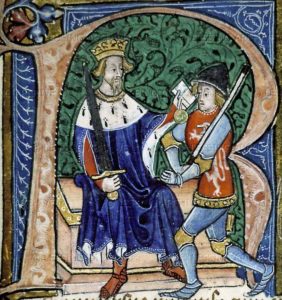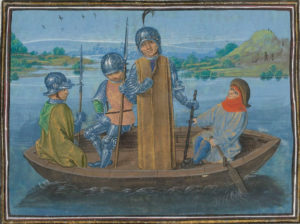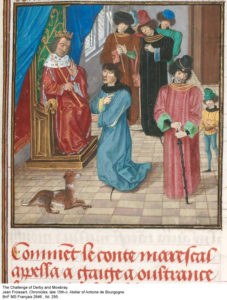
Considering that Thomas Mowbray, Earl of Nottingham (and later 1st Duke of Norfolk) participated in almost every major event of Richard II’s reign, it’s surprising that he’s been given so little attention by historians. It is evident that Thomas had a checkered career, in favor then out of favor then back again until his final outlawry. He is often depicted as a slippery character, though it’s not clear whether he was motivated by ambition, jealousy, or was he driven by circumstances? It’s hard to say, considering how difficult it was to maintain one’s equilibrium during Richard II’s tempestuous reign.
Orphaned at age two, Thomas and his elder brother John were brought up in the royal court alongside future rival Robert de Vere (another ward). All became close friends with Prince—soon to become King—Richard. John died in 1383, passing on the title Earl of Nottingham to Thomas, who was elected knight of the Garter in the same year. Two years later he was granted the title of Earl Marshal for life. Not bad for a nineteen year-old. He even had an apartment all his own at Eltham, the royal palace—reserved, naturally, for high-ranking nobles.
Nonetheless, trouble was brewing. Robert de Vere had managed to capture Richard’s affection and Thomas was increasingly left out. Rather than fight a losing battle he went over to the opposite court faction and married Elizabeth, the daughter of Richard Fitzalan, Earl of Arundel. I would assume he couldn’t have found a wife more calculated to alienate the king, though Richard did “distribute liveries of cloth to the earl’s wedding guests in 1384” (1). Nonetheless, Mowbray’s association with Arundel put him squarely in the Lords Appellant camp, just in time to march against Robert de Vere who was attempting to bring a force from Cheshire to protect the king against his rebellious nobles. Alas, de Vere was no general and his army made a pitiful showing at Radcot Bridge, eventually surrendering with very little loss of life. Robert fled to the Continent; that thorn in Mowbray’s side was removed forever.

By then, Henry of Bolingbroke (future King Henry IV) had joined forces with the Lords Appellant, making their number five. After Radcot Bridge the victors confronted King Richard in the Tower, forcing their agenda down his throat and threatening to depose him. Cowed after three days’ isolation in the Tower, the king agreed to call parliament. It met in January of 1388, ushering in the worst year of Richard’s life.
Bolingbroke and Mowbray, the junior Appellants, mainly kept quiet during the Merciless Parliament, only asserting themselves against their elders when it came time to condemn Richard’s beloved vice-chamberlain, Sir Simon Burley. By now, the Merciless Parliament had become a bloodbath and the senior Appellants knew that unless their purge was total, the survivors would demand retribution. Too bad for them that the king himself would take on the mantle of avenger ten years later.
But Richard had noted Mowbray’s reticence and decided to bring him back into the fold. In 1389 he made Mowbray Warden of the East March toward Scotland; later Thomas became Captain of Calais and royal lieutenant in the north-east of France. He accompanied the king to Ireland in 1394 and was credited with many successful assignments; he even came within a hair’s breadth of capturing Art MacMurchadha abed with his wife. Shortly thereafter, Mowbray went to France to negotiate a truce and Richard’s marriage to Princess Isabella.
But Mowbray’s uneasy favor with Richard was sorely tested in 1397 when the king launched his tardy retribution against the senior Lords Appellant. Conniving with his new affinity of noble supporters (including Mowbray), Richard initiated a new Appeal against Gloucester, Warwick, and Arundel. Capturing Warwick was easy; the king invited all three to a formal dinner and Warwick was the only one who showed up. A polite, entertaining evening ensued, at the end of which the king ordered the unwary Warwick’s arrest. Immediately afterwards, Arundel was persuaded to give himself up. Richard dealt with Gloucester in person. Collecting a large retinue including Mowbray, the king rode all night to Gloucester’s Pleshy residence, dragging the sick duke out of bed and arresting him as well. Gloucester was placed into Mowbray’s charge and taken to Calais where he was imprisoned in the castle.
The king was adamant; he did not dare appeal Gloucester in person in front of parliament. Politically, that was too volatile. But he needed proof of the duke’s guilt relating to the Merciless Parliament of 1388. A lot of suspicious activities took place in Gloucester’s prison under the unwilling direction of Thomas Mowbray, Captain of Calais. Eventually a confession was extracted from the duke, and shortly thereafter a sullen Mowbray announced before parliament that Gloucester was dead. No further explanation was forthcoming and after the confession was read Gloucester was condemned as a traitor in absentia. But naturally rumors abounded and Mowbray was implicated beyond a doubt.
After the Revenge Parliament, as it came to be called, the king created a slew of dukes to reward his supporters—sneeringly called “the duketti” by contemporaries. Even Mowbray was created Duke of Norfolk. But it wasn’t enough to reassure Thomas. After all, he was one of the five Appellants; now that the king was finished with the instigators he was bound to cast his vengeful eye on the remaining two. From then on, Thomas feared for his own life and stayed away from court as much as he could.

But he finally broke under the stress. In December that same year, Mowbray caught up with Bolingbroke on the road to London. He wasted no time in getting to the point. “Henry, we are about to be undone!” he is said to have declared. When Henry asked him why, he replied, “for what was done at Radcot Bridge”.(2) Pretending astonishment (or was he pretending?) Bolingbroke objected: look at the honors Richard showered them with; they had all received pardons. But Mowbray believed none of it. He even told Henry there were men plotting the destruction of him and his father. He hoped Henry would help devise a plan for their mutual defense.
But poor Mowbray had badly miscalculated. Far from allying himself with his former Appellant, Bolingbroke made a report to the king (or he told his father who went to the king). Then followed a series of accusations and denials, counter-accusations and further denials. Unable to settle this argument amicably, the court of chivalry decided on a trial by combat. It was to be the event of the decade. Held at Coventry, the tournament was attended by knights from as far away as France, and the two challengers went to great lengths to acquire the very best and most expensive armor and trappings. But all was for naught. As depicted by Shakespeare, as soon as Mowbray and Bolingbroke started their charge, King Richard threw in his baton and halted the fight. After discussing the matter with his council, the king declared that Bolingbroke would be exiled for ten years and Mowbray for life.
It was a devastating decision for the Duke of Norfolk. He took his leave shortly thereafter with a small retinue, forbidden to make any contact with Bolingbroke—not that he was very likely to. One wonders if he would have been recalled to England after Henry became king, but we’ll never know. He died in Venice just a year later, somewhere around the 22nd or 27th of September in 1399—just a few days before Richard was forced to abdicate. His young son, another Thomas, was not permitted to assume his father’s titles and soon involved himself in political turmoil, finally joining the ill-fated revolt of Archbishop Scrope in 1405, where he was beheaded alongside the prelate.
- “The Politics of Magnate Power” by Alastair Dunn, Clarendon Press, Oxford, 2003, p. 40
- “Chronicles of the Revolution 1397-1400” by Chris Given-Wilson, p.86